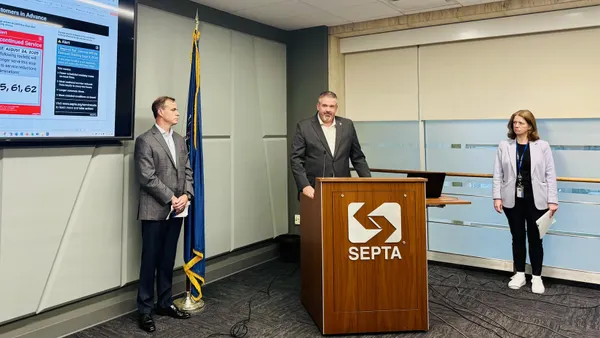Editor's note: This article was originally published in American City & County, which has merged with Smart Cities Dive to bring you expanded coverage of city innovation and local government. For the latest in smart city news, explore Smart Cities Dive or sign up for our newsletter.
The U.S. Conference of Mayors called on U.S. Immigration and Customs Enforcement officials to notify local authorities before conducting raids, to conduct actions “in as orderly a way as possible” and to “focus its deportation actions on convicted serious criminals and not hardworking individuals who pay taxes and contribute to the local and national economies.”
The mayors adopted the resolution during the group’s annual meeting in Tampa, Florida, on Sunday. Maintaining public safety is a top priority for all mayors, the resolution states, and “working with their police chiefs, community leaders and residents they have had great success in doing this in recent years.”
Columbus, Ohio Mayor Andrew Ginther, president of the U.S. Conference of Mayors, praised Los Angeles Mayor Karen Bass for her steady leadership during ICE raids and the deployment of National Guard members and Marines to quell protests in the city earlier this month. “The federal government's decision to deploy the National Guard to Los Angeles without consent and, indeed, over the objection of the governor, is an unprecedented overstep,” he said during a press conference announcing the resolution.
Ginther, who introduced the resolution, said it “is a critical step towards ensuring that federal actions respect our communities, prioritize genuine threats and uphold the fundamental rights of residents.”
San Diego Mayor Todd Gloria said that during a recent raid in his city, several ICE agents came to a popular restaurant on a Friday night looking for “a handful of dishwashers, bus boys, waiters and waitresses.”
“You had a large incursion into the restaurant” by “military-esque immigration enforcement,” he said during the press conference. “They stayed over an hour. During that hour of time, word spread through the community that this was happening. Nearly 200 San Diegans showed up to express their opposition to this kind of enforcement.”
Following “a very tense exchange” with residents, ICE agents used flash bangs, explosive devices that give off blinding light and make loud noises, to disburse the crowd.
The immigrants ICE detained in the raid “to my knowledge, have no criminal histories,” Gloria said.
“Because of the coordination, or lack thereof, my officers were called to respond to that situation. The radio calls were for hundreds of people in the streets that were protesting and blocking the traffic,” he said. The presence of armed ICE agents at a local restaurant “puts everyone at risk, including the federal agents that were doing their jobs that day,” he said.
Gloria said the event has galvanized the community, but it was a dangerous situation that could have been avoided. He said he met with Homeland Security Investigations (HIS) to voice his concerns and suggest there was a better way for ICE to achieve its goals than raiding a restaurant on a busy weekend night.
Fresno, California, Mayor Jerry Dyer, who served for 40 years in the Fresno Police Department — the last 18 as the police chief — said that “for police officers to be effective within the cities in which they police and the neighborhoods in which they police, they must be seen as a welcome presence. They cannot be seen as an occupying force.”
“Unfortunately, what we are seeing today in many cities across America, including LA, is an occupying force,” he said.
Dyer said police officers must have the community’s trust to be effective. “What I am seeing today in America, unfortunately, is an erosion of that trust of law enforcement, and it's largely because of what's happening. Not the fact that we're having immigration enforcement, but how immigration enforcement is occurring in cities.”
Dyer objected to how ICE agents are operating in cities: everyday use of tactical gear, their tactics and their lack of coordination with local law enforcement. He also objected to the federal government not seeking permission from local jurisdictions to deploy the National Guard or military troops.
“Because at the end of the day,” he said, “it's local law enforcement and it's the mayors that have to deal with what has occurred in that city.”










